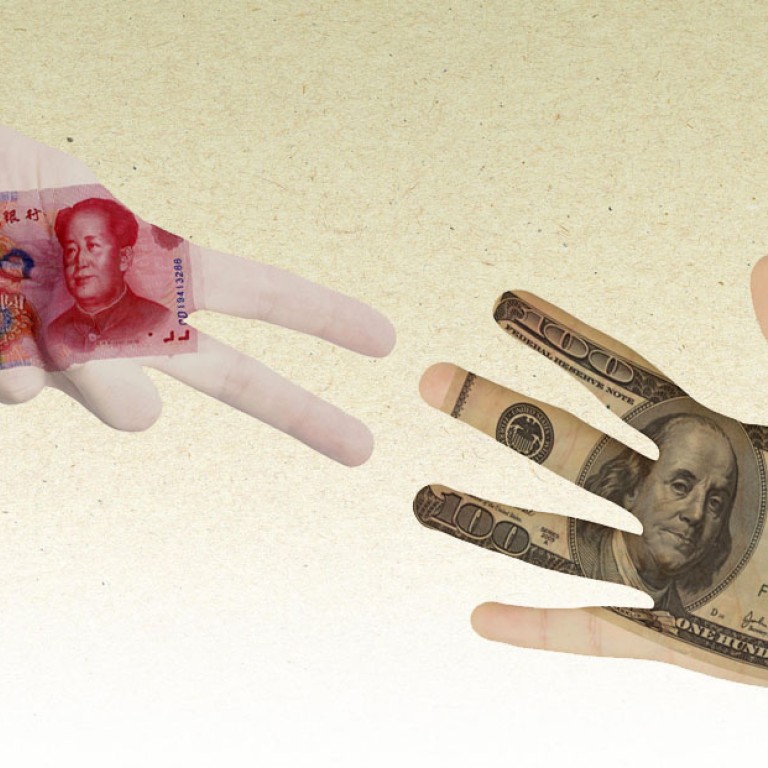
Currency caution
PBOC's blatant meddling to hold back the rally in the yuan suggests a deep-seated wariness by regulators about plans for eventual liberalisation
China's tolerance for a sustained yuan rally is reinforcing its commitment to wean the economy off export dependence, but its unapologetic market meddling to hold back the pace of appreciation shows deep wariness of currency liberalisation.

But the tightly choreographed nature of the currency's rise undermines hopes that Beijing is finally ready to let capital flow freely in and out of the country, another reform high on the wish list of many Western nations.
China's foreign-currency reserves exploded by upward of US$163 billion in the third quarter of the year, the largest absolute increase on record and the biggest percentage rise since February 2007.
The increase reflects market intervention by the central bank to keep the yuan from rising too quickly, which could attract more speculative inflows.
"The PBOC has been purchasing foreign exchange at a frantic rate in recent weeks, underlining again how reluctant policymakers are to leave the [yuan] in the hands of market forces," said Mark Williams and Wang Qinwei of Capital Economics in a research note. "Among many other implications, this suggests that capital-account liberalisation is a long way off."
China's traded exchange rate set record highs against the dollar for four consecutive days this past week.
Traders said the PBOC had appeared in recent sessions to suspend its use of intermediaries to quietly buy dollars in the spot market, a practice that had effectively put appreciation on a leash in the spot market in the third quarter.

China's moves towards yuan liberalisation have always been a case of two steps forward and one step back.
Hong Kong Monetary Authority chief executive Norman Chan Tak-lam said on Thursday that the PBOC would likely to scrap the 20,000-yuan-a-day limit on currency conversion for people in the city.
Eddie Cheung, a foreign-currency strategist at Standard Chartered Bank, said the move confirmed a roadmap to liberalisation that Beijing had drawn up for the yuan.
The first step was to establish the yuan as a settlement currency for cross-border trade. To that end, in July 2010 the PBOC and the HKMA allowed corporations to open yuan accounts in Hong Kong.
The second step is to establish the yuan as a viable investment currency. The opening of instruments such as dim sum bonds and exchange-traded funds that invest directly in mainland equity markets has done a lot to generate Hong Kong investor interest in yuan-denominated investments. The impending PBOC decision to let Hong Kong investors convert into yuan at will, will speed up that process.
The PBOC has been purchasing foreign exchange at a frantic rate in recent weeks
People will be able to invest large sums of money in yuan in one go instead of waiting to convert money at the old rate of 20,000 per day.
The last leg was the establishment of the yuan as a global reserve currency, said Cheung, which would require full convertibility of the yuan.
Multinational firms are eager for Beijing to make it easier to repatriate their China earnings back to headquarters, but many domestic economists share Beijing's caution about the liberalisation of the yuan.
"I am a very strong reformer except for capital flows, and that should not be equated to pro-reform or not pro-reform," said Wang Tao, an economist at UBS. "I would think the biggest reforms are to the domestic financial system, domestic state-owned enterprises, pricing systems, fiscal systems; those are very important.
"In the meantime, having some sort of insulation between domestic issues and external shocks by maintaining controls on short-term capital flows is a good thing."
She points to the fractious state of a US political system that saw American lawmakers contemplate defaulting on outstanding debts in the service of a purely domestic policy debate.
China is one of America's biggest creditors.
That reinforces the long-term case for currency reforms, which would reduce China's dependence on the US dollar, Wang argues.
But it also supported those who said retaining short-term controls would prevent money from washing in and out of China no matter what while its economic recovery remained delicate, she said.

